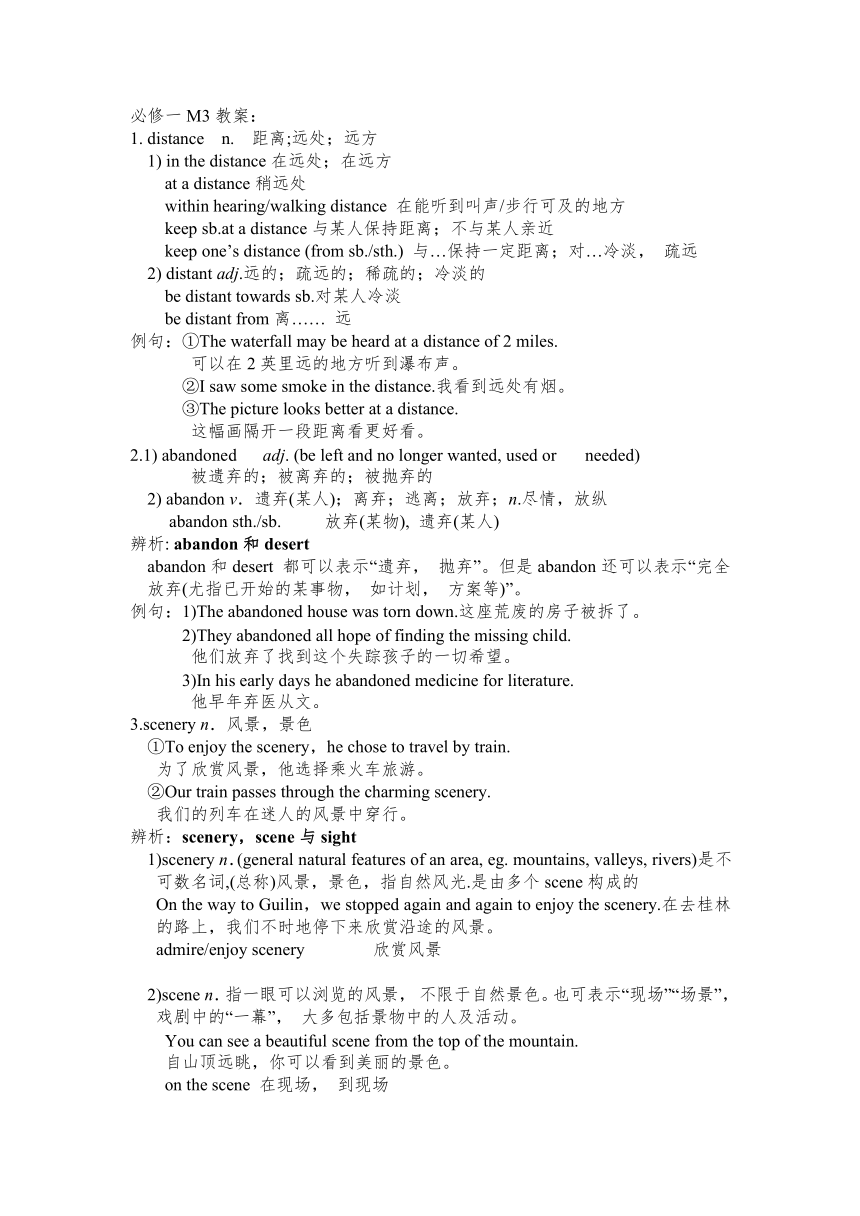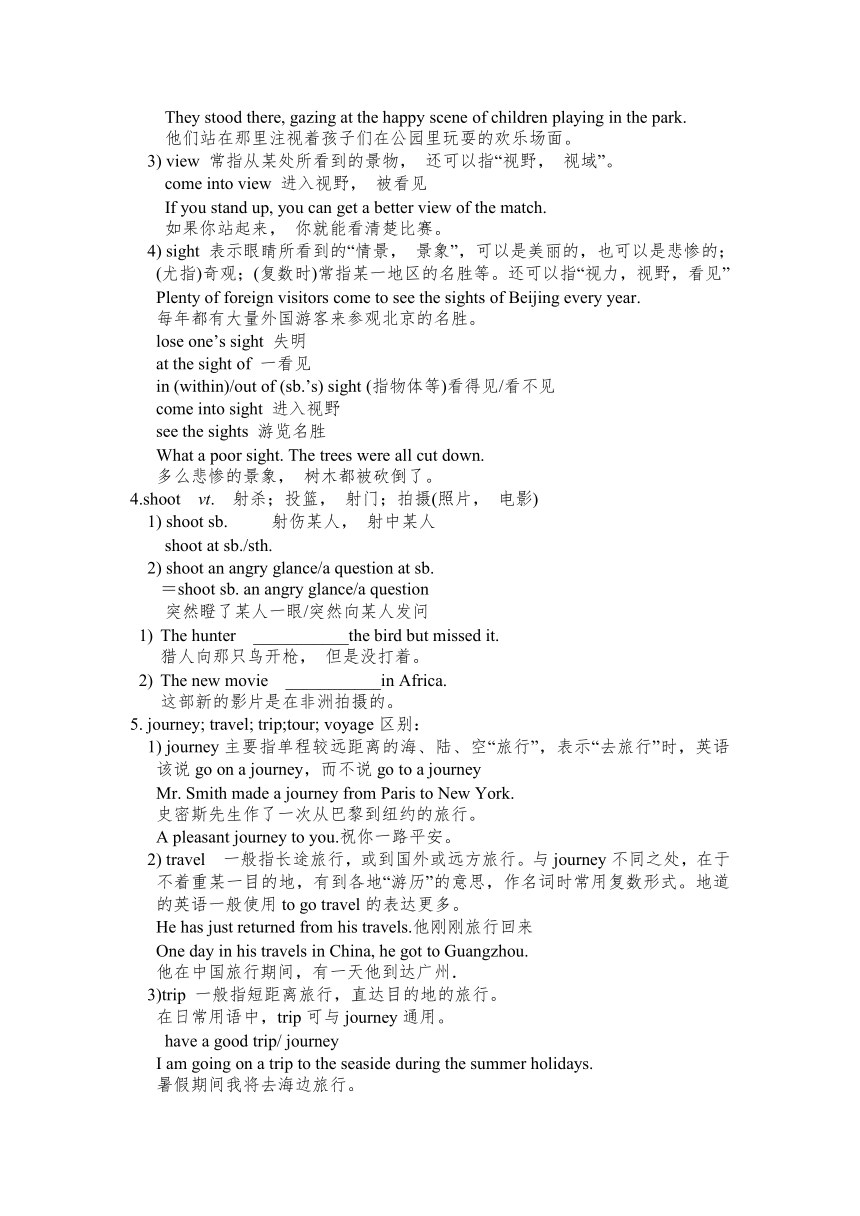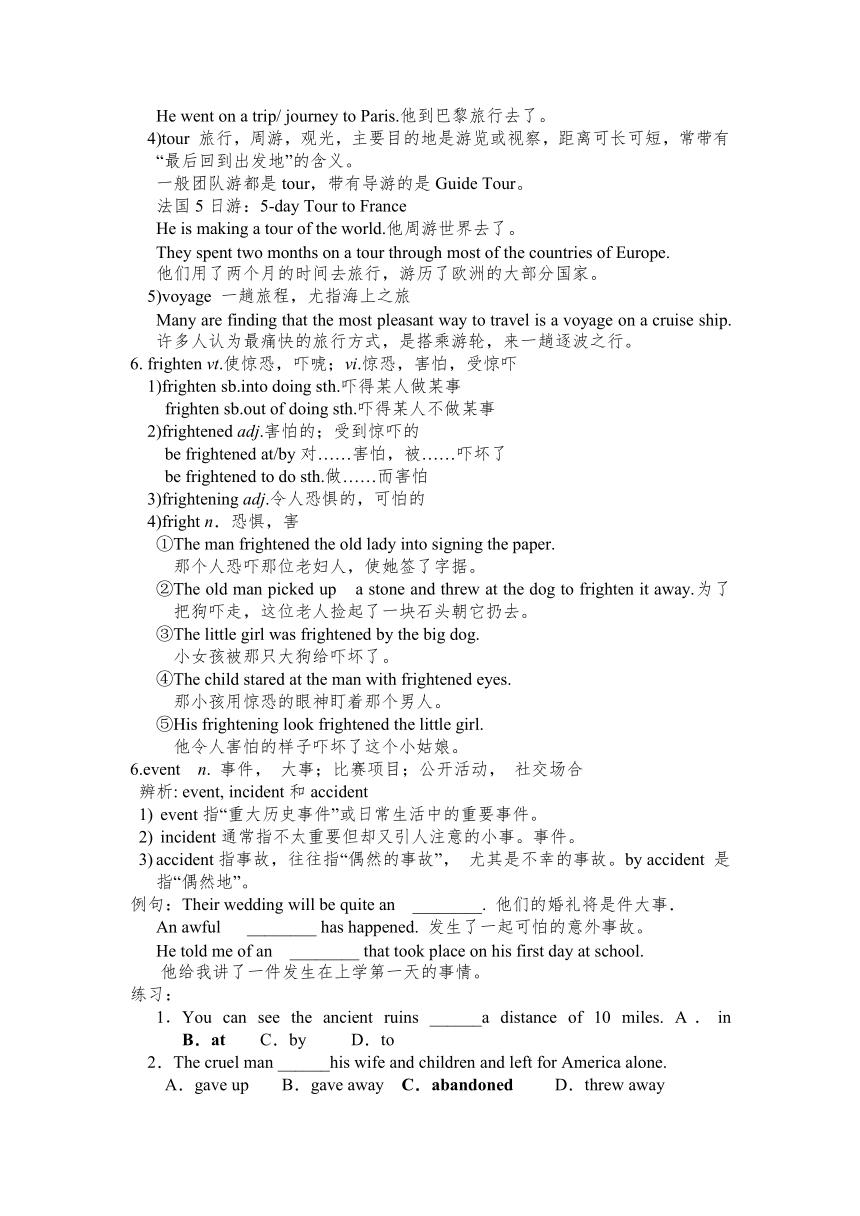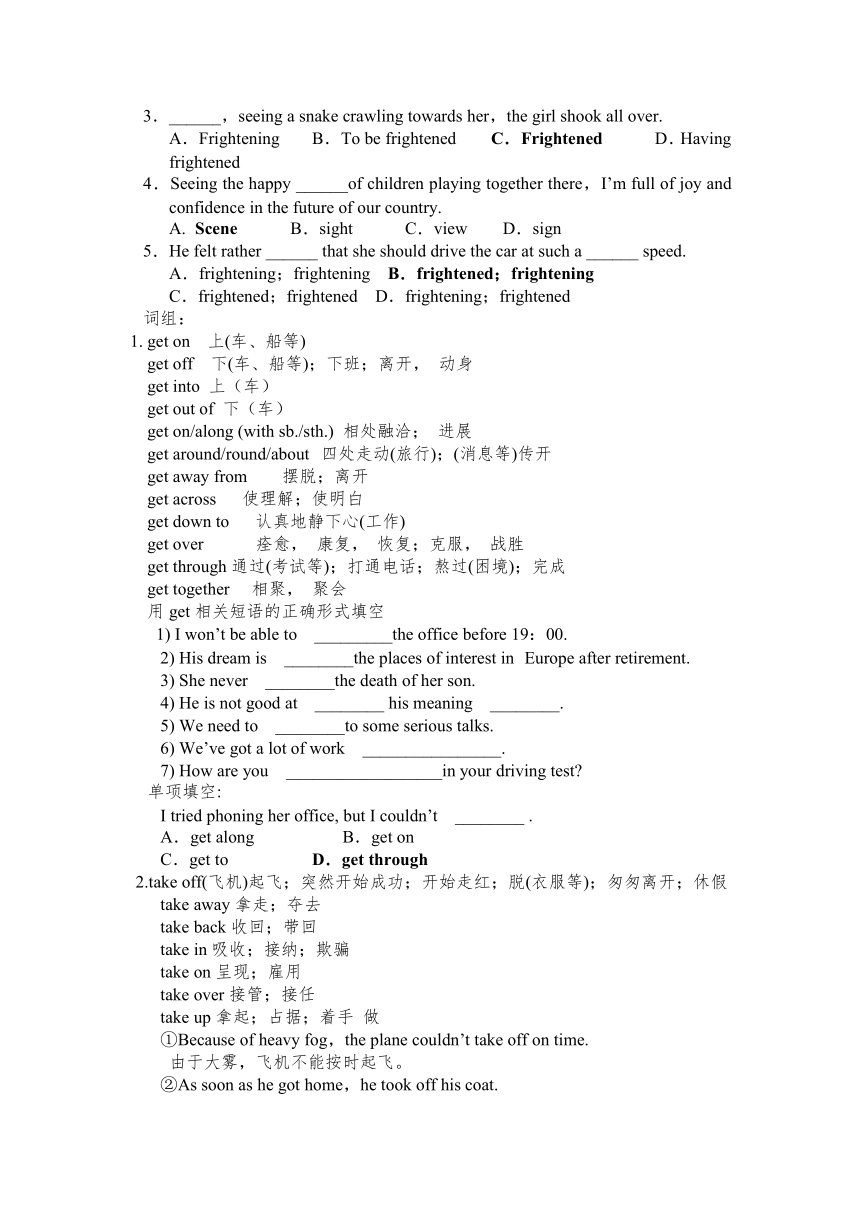必修一Module 3 My First Ride on a Train教案(高三一轮复习专用)
文档属性
| 名称 | 必修一Module 3 My First Ride on a Train教案(高三一轮复习专用) |  | |
| 格式 | zip | ||
| 文件大小 | 26.4KB | ||
| 资源类型 | 教案 | ||
| 版本资源 | 外研版 | ||
| 科目 | 英语 | ||
| 更新时间 | 2012-10-06 16:42:30 | ||
图片预览




文档简介
必修一M3教案:
1. distance n. 距离;远处;远方
1) in the distance在远处;在远方
at a distance稍远处
within hearing/walking distance 在能听到叫声/步行可及的地方
keep sb.at a distance与某人保持距离;不与某人亲近
keep one’s distance (from sb./sth.) 与…保持一定距离;对…冷淡, 疏远
2) distant adj.远的;疏远的;稀疏的;冷淡的
be distant towards sb.对某人冷淡
be distant from离…… 远
例句:①The waterfall may be heard at a distance of 2 miles.
可以在2英里远的地方听到瀑布声。
②I saw some smoke in the distance.我看到远处有烟。
③The picture looks better at a distance.
这幅画隔开一段距离看更好看。
2.1) abandoned adj. (be left and no longer wanted, used or needed)
被遗弃的;被离弃的;被抛弃的
2) abandon v.遗弃(某人);离弃;逃离;放弃;n.尽情,放纵
abandon sth./sb. 放弃(某物), 遗弃(某人)
辨析: abandon和desert
abandon和desert 都可以表示“遗弃, 抛弃”。但是abandon还可以表示“完全放弃(尤指已开始的某事物, 如计划, 方案等)”。
例句:1)The abandoned house was torn down.这座荒废的房子被拆了。
2)They abandoned all hope of finding the missing child.
他们放弃了找到这个失踪孩子的一切希望。
3)In his early days he abandoned medicine for literature.
他早年弃医从文。
3.scenery n.风景,景色
①To enjoy the scenery,he chose to travel by train.
为了欣赏风景,他选择乘火车旅游。
②Our train passes through the charming scenery.
我们的列车在迷人的风景中穿行。
辨析:scenery,scene与sight
1)scenery n.(general natural features of an area, eg. mountains, valleys, rivers)是不可数名词,(总称)风景,景色,指自然风光.是由多个scene构成的
On the way to Guilin,we stopped again and again to enjoy the scenery.在去桂林的路上,我们不时地停下来欣赏沿途的风景。
admire/enjoy scenery 欣赏风景
2)scene n.指一眼可以浏览的风景, 不限于自然景色。也可表示“现场”“场景”, 戏剧中的“一幕”, 大多包括景物中的人及活动。
You can see a beautiful scene from the top of the mountain.
自山顶远眺,你可以看到美丽的景色。
on the scene 在现场, 到现场
They stood there, gazing at the happy scene of children playing in the park.
他们站在那里注视着孩子们在公园里玩耍的欢乐场面。
3) view 常指从某处所看到的景物, 还可以指“视野, 视域”。
come into view 进入视野, 被看见
If you stand up, you can get a better view of the match.
如果你站起来, 你就能看清楚比赛。
4) sight 表示眼睛所看到的“情景, 景象”,可以是美丽的,也可以是悲惨的;(尤指)奇观;(复数时)常指某一地区的名胜等。还可以指“视力,视野,看见”
Plenty of foreign visitors come to see the sights of Beijing every year.
每年都有大量外国游客来参观北京的名胜。
lose one’s sight 失明
at the sight of 一看见
in (within)/out of (sb.’s) sight (指物体等)看得见/看不见
come into sight 进入视野
see the sights 游览名胜
What a poor sight. The trees were all cut down.
多么悲惨的景象, 树木都被砍倒了。
4.shoot vt. 射杀;投篮, 射门;拍摄(照片, 电影)
1) shoot sb. 射伤某人, 射中某人
shoot at sb./sth.
2) shoot an angry glance/a question at sb.
=shoot sb. an angry glance/a question
突然瞪了某人一眼/突然向某人发问
1) The hunter ___________the bird but missed it.
猎人向那只鸟开枪, 但是没打着。
2) The new movie ___________in Africa.
这部新的影片是在非洲拍摄的。
5. journey; travel; trip;tour; voyage区别:
1) journey主要指单程较远距离的海、陆、空“旅行”,表示“去旅行”时,英语该说go on a journey,而不说go to a journey
Mr. Smith made a journey from Paris to New York.
史密斯先生作了一次从巴黎到纽约的旅行。
A pleasant journey to you.祝你一路平安。
2) travel 一般指长途旅行,或到国外或远方旅行。与journey不同之处,在于不着重某一目的地,有到各地“游历”的意思,作名词时常用复数形式。地道的英语一般使用to go travel的表达更多。
He has just returned from his travels.他刚刚旅行回来
One day in his travels in China, he got to Guangzhou.
他在中国旅行期间,有一天他到达广州.
3)trip 一般指短距离旅行,直达目的地的旅行。
在日常用语中,trip可与journey通用。
have a good trip/ journey
I am going on a trip to the seaside during the summer holidays.
暑假期间我将去海边旅行。
He went on a trip/ journey to Paris.他到巴黎旅行去了。
4)tour 旅行,周游,观光,主要目的地是游览或视察,距离可长可短,常带有“最后回到出发地”的含义。
一般团队游都是tour,带有导游的是Guide Tour。
法国5日游:5-day Tour to France
He is making a tour of the world.他周游世界去了。
They spent two months on a tour through most of the countries of Europe.
他们用了两个月的时间去旅行,游历了欧洲的大部分国家。
5)voyage 一趟旅程,尤指海上之旅
Many are finding that the most pleasant way to travel is a voyage on a cruise ship. 许多人认为最痛快的旅行方式,是搭乘游轮,来一趟逐波之行。
6. frighten vt.使惊恐,吓唬;vi.惊恐,害怕,受惊吓
1)frighten sb.into doing sth.吓得某人做某事
frighten sb.out of doing sth.吓得某人不做某事
2)frightened adj.害怕的;受到惊吓的
be frightened at/by对……害怕,被……吓坏了
be frightened to do sth.做……而害怕
3)frightening adj.令人恐惧的,可怕的
4)fright n.恐惧,害
①The man frightened the old lady into signing the paper.
那个人恐吓那位老妇人,使她签了字据。
②The old man picked up a stone and threw at the dog to frighten it away.为了把狗吓走,这位老人捡起了一块石头朝它扔去。
③The little girl was frightened by the big dog.
小女孩被那只大狗给吓坏了。
④The child stared at the man with frightened eyes.
那小孩用惊恐的眼神盯着那个男人。
⑤His frightening look frightened the little girl.
他令人害怕的样子吓坏了这个小姑娘。
6.event n. 事件, 大事;比赛项目;公开活动, 社交场合
辨析: event, incident和accident
1) event指“重大历史事件”或日常生活中的重要事件。
2) incident通常指不太重要但却又引人注意的小事。事件。
3) accident指事故,往往指“偶然的事故”, 尤其是不幸的事故。by accident 是指“偶然地”。
例句:Their wedding will be quite an ________. 他们的婚礼将是件大事.
An awful ________ has happened. 发生了一起可怕的意外事故。
He told me of an ________ that took place on his first day at school.
他给我讲了一件发生在上学第一天的事情。
练习:
You can see the ancient ruins ______a distance of 10 miles. A.in B.at C.by D.to
2.The cruel man ______his wife and children and left for America alone.
A.gave up B.gave away C.abandoned D.threw away
3.______,seeing a snake crawling towards her,the girl shook all over.
A.Frightening B.To be frightened C.Frightened D.Having frightened
4.Seeing the happy ______of children playing together there,I’m full of joy and confidence in the future of our country.
Scene B.sight C.view D.sign
5.He felt rather ______ that she should drive the car at such a ______ speed.
A.frightening;frightening B.frightened;frightening
C.frightened;frightened D.frightening;frightened
词组:
1. get on 上(车、船等)
get off 下(车、船等);下班;离开, 动身
get into 上(车)
get out of 下(车)
get on/along (with sb./sth.) 相处融洽; 进展
get around/round/about 四处走动(旅行);(消息等)传开
get away from 摆脱;离开
get across 使理解;使明白
get down to 认真地静下心(工作)
get over 痊愈, 康复, 恢复;克服, 战胜
get through通过(考试等);打通电话;熬过(困境);完成
get together 相聚, 聚会
用get相关短语的正确形式填空
1) I won’t be able to _________the office before 19:00.
2) His dream is ________the places of interest in Europe after retirement.
3) She never ________the death of her son.
4) He is not good at ________ his meaning ________.
5) We need to ________to some serious talks.
6) We’ve got a lot of work ________________.
7) How are you __________________in your driving test
单项填空:
I tried phoning her office, but I couldn’t ________ .
A.get along B.get on
C.get to D.get through
2.take off(飞机)起飞;突然开始成功;开始走红;脱(衣服等);匆匆离开;休假
take away拿走;夺去
take back收回;带回
take in吸收;接纳;欺骗
take on呈现;雇用
take over接管;接任
take up拿起;占据;着手 做
①Because of heavy fog,the plane couldn’t take off on time.
由于大雾,飞机不能按时起飞。
②As soon as he got home,he took off his coat.
他一到家就脱掉外套。
③His mother was seriously ill,so he had to take a day off.
他妈妈病得严重,所以他不得不请一天假。
④His career took off when he was only ten.
十岁时他的事业便飞黄腾达了。
3.be short for (to be a shorter way of saying a name) 为……的缩写
run/go short (of) 短缺, 不足
in short / in a nutshell 简言之
for short 缩写, 简称
1) Her name is Alex, ___________Alexandra.
=Her name is Alexandra. We call her Alex __________. 她叫亚历山德拉, 简称艾里克斯。
2) _In short_, everyone should take part in the fight against pollution.
总之, 每个人都应该参与到抗污染的斗争中去。
3) I’m _short for moeny_ this week. 我这个星期缺钱。
4. 1) refer to提到,说到,涉及;查阅,参考;关系到
2)refer to...as将……称为……
3)refer to a dictionary查词 典
①In his speech,he didn’t refer to the problem at all.
在他的演说中,丝毫未涉及那个问题。
②When I said someone was foolish,I wasn’t referring to you.
当我说有些人很愚蠢时,我并不是指你。
③It was foolish of him to refer to his notes in the big exam.
他在重要考试中参考讲义,真是愚蠢。
④Johnson referred to the discovery as a major breakthrough in medical science. 约翰逊称这项发现是医学领域里的一个重大突破。
例题:1)It was foolish of him to______his notes during that important test,and as a result,he got punished.
stick to B.refer to C.keep to D.point to
2)The president spoke at the business meeting for nearly an hour without ______his notes. A.bringing up B.referring to C.looking for D.trying on
3)There are so many new words in this article that I can’t get along without ______the dictionary. A.sticking to B.referring to C.looking up D.putting up
4)It was at this point that her acting career really______. A.took up B.took off C.took in D.took down
5)After he retired from office,Rogers ______painting for a while,but soon lost interest. A.took up B.saved up C.kept up D.drew up
6)The plane______ at 10∶00,so you must try to be at the airport by 9∶00.
A.takes off B.is taken off C.took off D.is being taken off
5.Where do you think most of the people live,in the central part of the country or on the coast 你认为大多数人生活在哪里,国家的中部还是沿海?
do you think是插入语,位于疑问词之后,而且其后面要用陈述句语序。其结构为:特殊疑问词+do you think+陈述句语序。除think之外,还有believe,consider,suppose,imagine,guess和suggest
①What do you think he is doing?你认为他现在在做什么?
②Who do you suppose is fit for the job 你认为谁能胜任这份工作?
③Who do you suggest be sent to work on the farm
你建议派谁去农场工作呢?
I think,I believe, I suppose, I guess,I imagine,I find,I say,I know等也可用做插入语,置于句中或句末,一般用逗号隔开;此类插入语,若置于定语从句中,可不用标点。
④It is impossible,I think,that we should finish the job in such a short period of time. 我认为在这么短的时间内完成这项工作是不可能的。
请出示你的票好吗?
Would you mind...
后面接名词、动名词以及if引导的从句。if从句中要用一般过去时表示虚拟语气。但Do you mind后的if从句不用过去时态。
2)mind sb.doing sth.介意某人做某事
mind your own business管你自己的事,别管闲事
3)keep sth.in mind记住……
make up one’s mind下决心……
go/be out of one’s mind发狂,发疯
①Would you mind my/me smoking here
=Would you mind if I smoked here
=Do you mind if I smoke here?我在这儿抽烟你不介意吧?
②I have so much to do—I feel like I’m going out of my mind.
我有那么多事情要做——我觉得自己都快要疯了。
③It’s a good idea—I’ll keep it in mind.
这是个好主意——我要记在心里。
④He has made up his mind to resign,and that’s final.
他已下决心辞职,而且就那么定了。
回答Would you mind或Do you mind...?问句时,一定要特别注意前后文的一致性,常见的表“不介意”的答语有:No, of course not./Certainly not./Not at all./Go ahead./Do as you like./Not in the least.
表示“介意”或“不同意”时则常用较委婉的方式加以拒绝。如:
I’m sorry but I do./Sorry, you’d better not./I’m afraid you can’t./I’d rather you didn’t./I’m sorry, but it’s not allowed.等
I’m sorry,but I do;Yes,I do mind;I’m sorry,but you’d better not.
例题:1.—What fruit is in season now —Pears and apples,______.
A. I know B.I think C.I see D.I feel
2.______is the most influential film A.Do you think which of these
B.Which of these do you think C.Which of these do you know
D.You know which of these
3.—Would you mind ______ over one seat?My wife and I can sit together. — ______;I’d like to help you.
A.move;Yes B.moving;Of course not C.to move;Of course
D.moving;Certainly
4.—Would you mind ______the window?It’s hot here! —________.
A.to open;No,please B.open;Yes,please
C.opening;No,of course not D.opening;Yes,please
5.—Would you mind if I smoked here — ________ .
A.No, of course B.Yes, please C.No, please not
D.I’m sorry, but it’s not allowed
1 And what a ride! 多奇妙的旅程啊!
句型公式
感叹句
what引导的感叹句句型公式:
(1)What a/an (+adj. )+单数名词+主语+谓语!
(2) What (+adj. )+复数名词/不可数名词+主语+谓语!
how引导的感叹句句型公式:
(1) How+adj. +a/an+单数可数名词+主语+谓语!
(2)How+adj./adv. +主语+谓语!
(3) How+主语+谓语!
what 引导的感叹句的第一个句型和how引导的第一个句型可以互相转换。另外what 引导的感叹句中的形容词可以省略;what和how 引导的感叹句中的主谓部分也经常省略。
2 Would you mind showing me your ticket?/
Would you mind if I saw your ticket
请出示你的票好吗?
练习题:
1.[2010·浙江卷] After that, he knew he could ______ any emergency by doing what he could to the best of his ability.
A. get away with B. get on with C. get through D. get across
【解析】 C 考查动词词组辨析。句意:之后,他知道他能度过(get through)任何危机,只要他能尽自己最大的能力。A项意为“携带……而逃”;B项意为“与……友好相处,继续干”;D项意为“使……被理解”,均不符合语境,故排除。
2.He had a wonderful childhood, ______ with his mother to all corners of the world. A. travel B. to travel C. traveled D. traveling
3.[2010·北京卷] I'm calling to enquire about the position ______ in yesterday's China Daily. A. advertised B. to be advertised
C. advertising D. having advertised
4.I only know it is a ______ distance away from here, but I don’t know _____ the distance exactly is. A.great; how far B.great; what
C.far; how far D.far; what
【解析】 B 考查distance的用法和宾语从句。表示“距离远”,distance前面的形容词不可用far而是用great,good,long;对distance提问不用how far 而要用what,故选项中只有B项正确。
5.—Do you mind if I record your lecture — ______ . Go ahead.
A.Never mind B.No way C.Not at all D.No, you’d better not
6.The little boy came riding full speed down the motorway on his bicycle. ______ it was! A.What a dangerous scene B.What dangerous a scene
C.How a dangerous scene D.How dangerous the scene
7.“Things ______ never come again!” I couldn’t help talking to myself.
A.lost B.losing C.to lose D.have lost
8.Due to bad weather, the police had to ______ the search for the missing boy.
A.resign B.abandon C.conduct D.release
9.On Christmas Eve, our city held an outdoor ______ which attracted nearly 200 thousand people. A.incident B.event C.case D.affair
10.The rural ______ was so beautiful that he decided to stay one more week.
A.view B.scenery C.sight D.appearance
【解析】 B 考查名词词义辨析。view表示从某一地点或角度看到的风景;sight指看见(或看得见)的事物、景象;scenery 指的是某个地方风景的总称,因此表示“乡村风光”,应选择B项。
语法专练
本单元语法——以 ed形式作定语和过去时态的时间状语
1.The trees ______in the storm have been moved off the road.
A.being blown down B.blown down C.blowing down D.to blow down
2.—Can those ______at the back of the classroom hear me
—No problem. A.seat B.sit C.seated D.sat
3.It is one of the funniest things ______on the Internet so far this year.
A.finding B.being found C.to find D.found
4.(2009年江西卷)—Do you want a lift home —It’s very kind of you,but I have to work late in the office.I overslept this morning because my alarm clock ______. A.doesn’t go off B.won’t go off C.wasn’t going off D.didn’t go off
【解析】 句意为:——你想搭车回家吗?——你太好了,但是我不得不在办公室加班。因为闹钟没响,我今天早晨睡过头了。由题干中的overslept可知本句应该用一般过去时故排除A、B两项,语境中又没有强调在过去的某个时间点或时间段正在做某事,故排除C项。
(2009年山东卷)I was out of town at the time,so I don’t know exactly how it ______. A.was happening B.happened C.happens D.has happened
1. distance n. 距离;远处;远方
1) in the distance在远处;在远方
at a distance稍远处
within hearing/walking distance 在能听到叫声/步行可及的地方
keep sb.at a distance与某人保持距离;不与某人亲近
keep one’s distance (from sb./sth.) 与…保持一定距离;对…冷淡, 疏远
2) distant adj.远的;疏远的;稀疏的;冷淡的
be distant towards sb.对某人冷淡
be distant from离…… 远
例句:①The waterfall may be heard at a distance of 2 miles.
可以在2英里远的地方听到瀑布声。
②I saw some smoke in the distance.我看到远处有烟。
③The picture looks better at a distance.
这幅画隔开一段距离看更好看。
2.1) abandoned adj. (be left and no longer wanted, used or needed)
被遗弃的;被离弃的;被抛弃的
2) abandon v.遗弃(某人);离弃;逃离;放弃;n.尽情,放纵
abandon sth./sb. 放弃(某物), 遗弃(某人)
辨析: abandon和desert
abandon和desert 都可以表示“遗弃, 抛弃”。但是abandon还可以表示“完全放弃(尤指已开始的某事物, 如计划, 方案等)”。
例句:1)The abandoned house was torn down.这座荒废的房子被拆了。
2)They abandoned all hope of finding the missing child.
他们放弃了找到这个失踪孩子的一切希望。
3)In his early days he abandoned medicine for literature.
他早年弃医从文。
3.scenery n.风景,景色
①To enjoy the scenery,he chose to travel by train.
为了欣赏风景,他选择乘火车旅游。
②Our train passes through the charming scenery.
我们的列车在迷人的风景中穿行。
辨析:scenery,scene与sight
1)scenery n.(general natural features of an area, eg. mountains, valleys, rivers)是不可数名词,(总称)风景,景色,指自然风光.是由多个scene构成的
On the way to Guilin,we stopped again and again to enjoy the scenery.在去桂林的路上,我们不时地停下来欣赏沿途的风景。
admire/enjoy scenery 欣赏风景
2)scene n.指一眼可以浏览的风景, 不限于自然景色。也可表示“现场”“场景”, 戏剧中的“一幕”, 大多包括景物中的人及活动。
You can see a beautiful scene from the top of the mountain.
自山顶远眺,你可以看到美丽的景色。
on the scene 在现场, 到现场
They stood there, gazing at the happy scene of children playing in the park.
他们站在那里注视着孩子们在公园里玩耍的欢乐场面。
3) view 常指从某处所看到的景物, 还可以指“视野, 视域”。
come into view 进入视野, 被看见
If you stand up, you can get a better view of the match.
如果你站起来, 你就能看清楚比赛。
4) sight 表示眼睛所看到的“情景, 景象”,可以是美丽的,也可以是悲惨的;(尤指)奇观;(复数时)常指某一地区的名胜等。还可以指“视力,视野,看见”
Plenty of foreign visitors come to see the sights of Beijing every year.
每年都有大量外国游客来参观北京的名胜。
lose one’s sight 失明
at the sight of 一看见
in (within)/out of (sb.’s) sight (指物体等)看得见/看不见
come into sight 进入视野
see the sights 游览名胜
What a poor sight. The trees were all cut down.
多么悲惨的景象, 树木都被砍倒了。
4.shoot vt. 射杀;投篮, 射门;拍摄(照片, 电影)
1) shoot sb. 射伤某人, 射中某人
shoot at sb./sth.
2) shoot an angry glance/a question at sb.
=shoot sb. an angry glance/a question
突然瞪了某人一眼/突然向某人发问
1) The hunter ___________the bird but missed it.
猎人向那只鸟开枪, 但是没打着。
2) The new movie ___________in Africa.
这部新的影片是在非洲拍摄的。
5. journey; travel; trip;tour; voyage区别:
1) journey主要指单程较远距离的海、陆、空“旅行”,表示“去旅行”时,英语该说go on a journey,而不说go to a journey
Mr. Smith made a journey from Paris to New York.
史密斯先生作了一次从巴黎到纽约的旅行。
A pleasant journey to you.祝你一路平安。
2) travel 一般指长途旅行,或到国外或远方旅行。与journey不同之处,在于不着重某一目的地,有到各地“游历”的意思,作名词时常用复数形式。地道的英语一般使用to go travel的表达更多。
He has just returned from his travels.他刚刚旅行回来
One day in his travels in China, he got to Guangzhou.
他在中国旅行期间,有一天他到达广州.
3)trip 一般指短距离旅行,直达目的地的旅行。
在日常用语中,trip可与journey通用。
have a good trip/ journey
I am going on a trip to the seaside during the summer holidays.
暑假期间我将去海边旅行。
He went on a trip/ journey to Paris.他到巴黎旅行去了。
4)tour 旅行,周游,观光,主要目的地是游览或视察,距离可长可短,常带有“最后回到出发地”的含义。
一般团队游都是tour,带有导游的是Guide Tour。
法国5日游:5-day Tour to France
He is making a tour of the world.他周游世界去了。
They spent two months on a tour through most of the countries of Europe.
他们用了两个月的时间去旅行,游历了欧洲的大部分国家。
5)voyage 一趟旅程,尤指海上之旅
Many are finding that the most pleasant way to travel is a voyage on a cruise ship. 许多人认为最痛快的旅行方式,是搭乘游轮,来一趟逐波之行。
6. frighten vt.使惊恐,吓唬;vi.惊恐,害怕,受惊吓
1)frighten sb.into doing sth.吓得某人做某事
frighten sb.out of doing sth.吓得某人不做某事
2)frightened adj.害怕的;受到惊吓的
be frightened at/by对……害怕,被……吓坏了
be frightened to do sth.做……而害怕
3)frightening adj.令人恐惧的,可怕的
4)fright n.恐惧,害
①The man frightened the old lady into signing the paper.
那个人恐吓那位老妇人,使她签了字据。
②The old man picked up a stone and threw at the dog to frighten it away.为了把狗吓走,这位老人捡起了一块石头朝它扔去。
③The little girl was frightened by the big dog.
小女孩被那只大狗给吓坏了。
④The child stared at the man with frightened eyes.
那小孩用惊恐的眼神盯着那个男人。
⑤His frightening look frightened the little girl.
他令人害怕的样子吓坏了这个小姑娘。
6.event n. 事件, 大事;比赛项目;公开活动, 社交场合
辨析: event, incident和accident
1) event指“重大历史事件”或日常生活中的重要事件。
2) incident通常指不太重要但却又引人注意的小事。事件。
3) accident指事故,往往指“偶然的事故”, 尤其是不幸的事故。by accident 是指“偶然地”。
例句:Their wedding will be quite an ________. 他们的婚礼将是件大事.
An awful ________ has happened. 发生了一起可怕的意外事故。
He told me of an ________ that took place on his first day at school.
他给我讲了一件发生在上学第一天的事情。
练习:
You can see the ancient ruins ______a distance of 10 miles. A.in B.at C.by D.to
2.The cruel man ______his wife and children and left for America alone.
A.gave up B.gave away C.abandoned D.threw away
3.______,seeing a snake crawling towards her,the girl shook all over.
A.Frightening B.To be frightened C.Frightened D.Having frightened
4.Seeing the happy ______of children playing together there,I’m full of joy and confidence in the future of our country.
Scene B.sight C.view D.sign
5.He felt rather ______ that she should drive the car at such a ______ speed.
A.frightening;frightening B.frightened;frightening
C.frightened;frightened D.frightening;frightened
词组:
1. get on 上(车、船等)
get off 下(车、船等);下班;离开, 动身
get into 上(车)
get out of 下(车)
get on/along (with sb./sth.) 相处融洽; 进展
get around/round/about 四处走动(旅行);(消息等)传开
get away from 摆脱;离开
get across 使理解;使明白
get down to 认真地静下心(工作)
get over 痊愈, 康复, 恢复;克服, 战胜
get through通过(考试等);打通电话;熬过(困境);完成
get together 相聚, 聚会
用get相关短语的正确形式填空
1) I won’t be able to _________the office before 19:00.
2) His dream is ________the places of interest in Europe after retirement.
3) She never ________the death of her son.
4) He is not good at ________ his meaning ________.
5) We need to ________to some serious talks.
6) We’ve got a lot of work ________________.
7) How are you __________________in your driving test
单项填空:
I tried phoning her office, but I couldn’t ________ .
A.get along B.get on
C.get to D.get through
2.take off(飞机)起飞;突然开始成功;开始走红;脱(衣服等);匆匆离开;休假
take away拿走;夺去
take back收回;带回
take in吸收;接纳;欺骗
take on呈现;雇用
take over接管;接任
take up拿起;占据;着手 做
①Because of heavy fog,the plane couldn’t take off on time.
由于大雾,飞机不能按时起飞。
②As soon as he got home,he took off his coat.
他一到家就脱掉外套。
③His mother was seriously ill,so he had to take a day off.
他妈妈病得严重,所以他不得不请一天假。
④His career took off when he was only ten.
十岁时他的事业便飞黄腾达了。
3.be short for (to be a shorter way of saying a name) 为……的缩写
run/go short (of) 短缺, 不足
in short / in a nutshell 简言之
for short 缩写, 简称
1) Her name is Alex, ___________Alexandra.
=Her name is Alexandra. We call her Alex __________. 她叫亚历山德拉, 简称艾里克斯。
2) _In short_, everyone should take part in the fight against pollution.
总之, 每个人都应该参与到抗污染的斗争中去。
3) I’m _short for moeny_ this week. 我这个星期缺钱。
4. 1) refer to提到,说到,涉及;查阅,参考;关系到
2)refer to...as将……称为……
3)refer to a dictionary查词 典
①In his speech,he didn’t refer to the problem at all.
在他的演说中,丝毫未涉及那个问题。
②When I said someone was foolish,I wasn’t referring to you.
当我说有些人很愚蠢时,我并不是指你。
③It was foolish of him to refer to his notes in the big exam.
他在重要考试中参考讲义,真是愚蠢。
④Johnson referred to the discovery as a major breakthrough in medical science. 约翰逊称这项发现是医学领域里的一个重大突破。
例题:1)It was foolish of him to______his notes during that important test,and as a result,he got punished.
stick to B.refer to C.keep to D.point to
2)The president spoke at the business meeting for nearly an hour without ______his notes. A.bringing up B.referring to C.looking for D.trying on
3)There are so many new words in this article that I can’t get along without ______the dictionary. A.sticking to B.referring to C.looking up D.putting up
4)It was at this point that her acting career really______. A.took up B.took off C.took in D.took down
5)After he retired from office,Rogers ______painting for a while,but soon lost interest. A.took up B.saved up C.kept up D.drew up
6)The plane______ at 10∶00,so you must try to be at the airport by 9∶00.
A.takes off B.is taken off C.took off D.is being taken off
5.Where do you think most of the people live,in the central part of the country or on the coast 你认为大多数人生活在哪里,国家的中部还是沿海?
do you think是插入语,位于疑问词之后,而且其后面要用陈述句语序。其结构为:特殊疑问词+do you think+陈述句语序。除think之外,还有believe,consider,suppose,imagine,guess和suggest
①What do you think he is doing?你认为他现在在做什么?
②Who do you suppose is fit for the job 你认为谁能胜任这份工作?
③Who do you suggest be sent to work on the farm
你建议派谁去农场工作呢?
I think,I believe, I suppose, I guess,I imagine,I find,I say,I know等也可用做插入语,置于句中或句末,一般用逗号隔开;此类插入语,若置于定语从句中,可不用标点。
④It is impossible,I think,that we should finish the job in such a short period of time. 我认为在这么短的时间内完成这项工作是不可能的。
请出示你的票好吗?
Would you mind...
后面接名词、动名词以及if引导的从句。if从句中要用一般过去时表示虚拟语气。但Do you mind后的if从句不用过去时态。
2)mind sb.doing sth.介意某人做某事
mind your own business管你自己的事,别管闲事
3)keep sth.in mind记住……
make up one’s mind下决心……
go/be out of one’s mind发狂,发疯
①Would you mind my/me smoking here
=Would you mind if I smoked here
=Do you mind if I smoke here?我在这儿抽烟你不介意吧?
②I have so much to do—I feel like I’m going out of my mind.
我有那么多事情要做——我觉得自己都快要疯了。
③It’s a good idea—I’ll keep it in mind.
这是个好主意——我要记在心里。
④He has made up his mind to resign,and that’s final.
他已下决心辞职,而且就那么定了。
回答Would you mind或Do you mind...?问句时,一定要特别注意前后文的一致性,常见的表“不介意”的答语有:No, of course not./Certainly not./Not at all./Go ahead./Do as you like./Not in the least.
表示“介意”或“不同意”时则常用较委婉的方式加以拒绝。如:
I’m sorry but I do./Sorry, you’d better not./I’m afraid you can’t./I’d rather you didn’t./I’m sorry, but it’s not allowed.等
I’m sorry,but I do;Yes,I do mind;I’m sorry,but you’d better not.
例题:1.—What fruit is in season now —Pears and apples,______.
A. I know B.I think C.I see D.I feel
2.______is the most influential film A.Do you think which of these
B.Which of these do you think C.Which of these do you know
D.You know which of these
3.—Would you mind ______ over one seat?My wife and I can sit together. — ______;I’d like to help you.
A.move;Yes B.moving;Of course not C.to move;Of course
D.moving;Certainly
4.—Would you mind ______the window?It’s hot here! —________.
A.to open;No,please B.open;Yes,please
C.opening;No,of course not D.opening;Yes,please
5.—Would you mind if I smoked here — ________ .
A.No, of course B.Yes, please C.No, please not
D.I’m sorry, but it’s not allowed
1 And what a ride! 多奇妙的旅程啊!
句型公式
感叹句
what引导的感叹句句型公式:
(1)What a/an (+adj. )+单数名词+主语+谓语!
(2) What (+adj. )+复数名词/不可数名词+主语+谓语!
how引导的感叹句句型公式:
(1) How+adj. +a/an+单数可数名词+主语+谓语!
(2)How+adj./adv. +主语+谓语!
(3) How+主语+谓语!
what 引导的感叹句的第一个句型和how引导的第一个句型可以互相转换。另外what 引导的感叹句中的形容词可以省略;what和how 引导的感叹句中的主谓部分也经常省略。
2 Would you mind showing me your ticket?/
Would you mind if I saw your ticket
请出示你的票好吗?
练习题:
1.[2010·浙江卷] After that, he knew he could ______ any emergency by doing what he could to the best of his ability.
A. get away with B. get on with C. get through D. get across
【解析】 C 考查动词词组辨析。句意:之后,他知道他能度过(get through)任何危机,只要他能尽自己最大的能力。A项意为“携带……而逃”;B项意为“与……友好相处,继续干”;D项意为“使……被理解”,均不符合语境,故排除。
2.He had a wonderful childhood, ______ with his mother to all corners of the world. A. travel B. to travel C. traveled D. traveling
3.[2010·北京卷] I'm calling to enquire about the position ______ in yesterday's China Daily. A. advertised B. to be advertised
C. advertising D. having advertised
4.I only know it is a ______ distance away from here, but I don’t know _____ the distance exactly is. A.great; how far B.great; what
C.far; how far D.far; what
【解析】 B 考查distance的用法和宾语从句。表示“距离远”,distance前面的形容词不可用far而是用great,good,long;对distance提问不用how far 而要用what,故选项中只有B项正确。
5.—Do you mind if I record your lecture — ______ . Go ahead.
A.Never mind B.No way C.Not at all D.No, you’d better not
6.The little boy came riding full speed down the motorway on his bicycle. ______ it was! A.What a dangerous scene B.What dangerous a scene
C.How a dangerous scene D.How dangerous the scene
7.“Things ______ never come again!” I couldn’t help talking to myself.
A.lost B.losing C.to lose D.have lost
8.Due to bad weather, the police had to ______ the search for the missing boy.
A.resign B.abandon C.conduct D.release
9.On Christmas Eve, our city held an outdoor ______ which attracted nearly 200 thousand people. A.incident B.event C.case D.affair
10.The rural ______ was so beautiful that he decided to stay one more week.
A.view B.scenery C.sight D.appearance
【解析】 B 考查名词词义辨析。view表示从某一地点或角度看到的风景;sight指看见(或看得见)的事物、景象;scenery 指的是某个地方风景的总称,因此表示“乡村风光”,应选择B项。
语法专练
本单元语法——以 ed形式作定语和过去时态的时间状语
1.The trees ______in the storm have been moved off the road.
A.being blown down B.blown down C.blowing down D.to blow down
2.—Can those ______at the back of the classroom hear me
—No problem. A.seat B.sit C.seated D.sat
3.It is one of the funniest things ______on the Internet so far this year.
A.finding B.being found C.to find D.found
4.(2009年江西卷)—Do you want a lift home —It’s very kind of you,but I have to work late in the office.I overslept this morning because my alarm clock ______. A.doesn’t go off B.won’t go off C.wasn’t going off D.didn’t go off
【解析】 句意为:——你想搭车回家吗?——你太好了,但是我不得不在办公室加班。因为闹钟没响,我今天早晨睡过头了。由题干中的overslept可知本句应该用一般过去时故排除A、B两项,语境中又没有强调在过去的某个时间点或时间段正在做某事,故排除C项。
(2009年山东卷)I was out of town at the time,so I don’t know exactly how it ______. A.was happening B.happened C.happens D.has happened
同课章节目录
